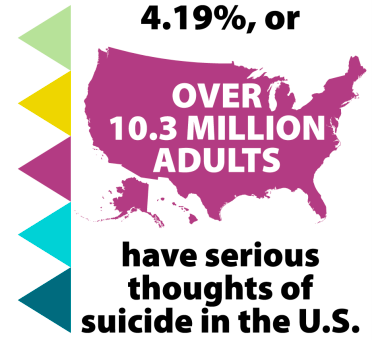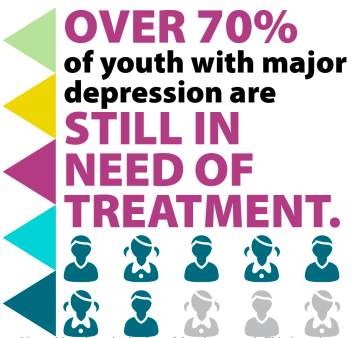Mental Health in America

4.19% or más de 10.3 millones adultos tienen pensamientos serios del suicidio en los EEUU.
April 6, 2020
Imagine a world in which we cared and talked about mental health as much as physical health. If this were the case, we’d be living in a significantly better world.
One may not realize what others around them are facing, especially if they are reserved when it comes to talking about themselves. Even a close family member may be going through something nobody knows about. The lack of mental health awareness is detrimental to the health of many in our society and is continued through social stigma.
To provide perspective, 1 in 5 adults are currently dealing with a mental illness, and only 43% receive treatment. Amongst young people, 1 in 6 people aged 6-17 suffer from one or more mental illnesses, with only 50% of those people receiving treatment. In the US, 17.7 million people are dealing with depression, 1.5 million have schizophrenia, 7 million have bipolar, 9 million have PTSD, 3 million have OCD, and 3.5 million have borderline personality disorder (NAMI).
There are many factors that contribute to the fact that so many people are mentally ill, but so few receive treatment. One is a lack of awareness. As mentioned earlier, not enough people are not educated on the early signs of many of these illnesses. This results in a massive amount of individuals that are often left untreated for far longer than necessary. Their illness progresses, and as with any illness, early intervention is key.
The stigma surrounding mental illness also makes dealing with it harder. Mental illness is not talked about much in the media or generally in society. Many people are sadly led to believe that taking medication or speaking with a therapist is shameful and unnatural. This issue is especially prominent in young boys and men since there’s a social stigma of having to be “manly” and not being able to reach out for help since they should deal with it alone.
Unfortunately, treatment is also very hard to get, even when people truly want to get better. Many programs have terrible waitlists that can take months or even years. Once people get into programs or individual treatment, very few practitioners accept insurance. This indicates that patients must pay out of pocket for services, which are typically hundreds of dollars per session.
It is vital to receive help if you are concerned about your mental state. A woman by the name of Michelle Dickinson grew up with her mother experiencing bipolar disorder. She posted an article on NAMI’s website, explaining how hard it was on her mother and herself while she was growing up. She said, “There were times when I’d have to stay home from school because my father had to work, and [my mother] was too fragile to be home by herself. And when I was in school, instead of paying attention to my teachers, I’d spend all day worrying about how my mom was doing—plus, I was weighed down with keeping the secret that I had a ‘crazy’ mother.” If her mother had received help, Dickinson could’ve had a much happier youth. Furthermore, the poor circumstances she dealt with probably caused her to develop a mental illness in her later years.
Many people experiencing a mental illness are familiar with others just telling them to “shape up” or “be happy” without realizing that there is no way they could possibly achieve that on their own. Other people tell them to turn to religion. They say things like, “it’s all in your head” regarding these illnesses. This overall lack of education has led to people suffering for far longer than they have to with mental illness, and this continues today.

